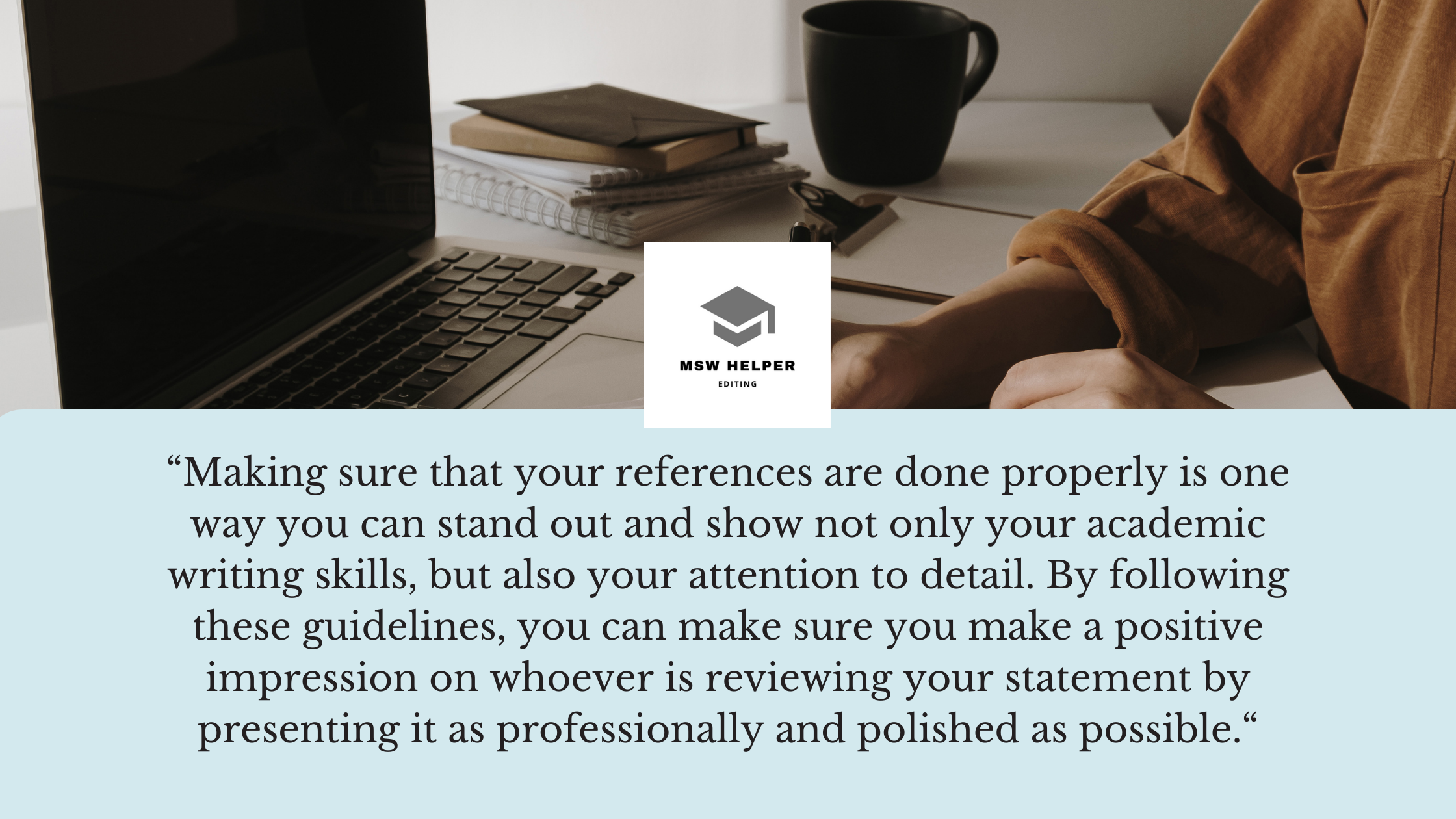5 Ways Your Social Justice Personal Statement Might Be Missing the Mark
As you are working on your MSW applications, you will probably notice that a lot of schools will ask you to write an analysis about a social justice issue that you are interested in. This section is one that can often be overlooked, and applicants may not spend as much time on it because it isn’t as “personal” as the other parts of the statement.
However, this section of the application is super important because it allows you to really show off your research and academic writing skills, which will help show the school you are applying for that you are prepared for graduate-level studies in social work.
In this blog post, I’m outlining the 5 most common mistakes I see in the social work social justice issue section when reviewing personal statements. I’ll also share some tips for how to avoid making them so you can make sure your social justice issue is top-notch!
Key issues:
Not relating your area of interest to your social justice issue
Not including enough (or any) references
Not including any scholarly sources
Picking a social issue that is too broad
Using inconsistent or incorrect formatting
Mistake #1: Not Relating Your Area of Interest To Your Social Justice Issue
One of the most common mistakes when writing the social work social justice section, and one that ultimately impacts the entire statement as a whole, is not relating the topic of interest that you are analyzing to the rest of the statement. What I mean by this is that generally, it makes for a stronger statement if you relate your area of analysis to your previous professional or personal experience which you will have already discussed earlier in the statement most of the time. As a bonus, you can also relate the topic you are analyzing to any future career goals that you highlight later in the statement!
Let me explain this with an example: say you have previous experience volunteering with a harm reduction program or supporting people experiencing substance abuse, and your goal after your MSW is to be an addictions counsellor. It would make a lot more sense to write your analysis of a social justice issue on a topic like the relationship between socioeconomic status and substance abuse than it would to write about something totally unrelated, like issues with access to English-language learning programs for immigrant children.
Basically, by choosing a topic that is related to the rest of your statement, it will not only come across that you are genuinely interested in the topic, but it will also make the statement as a whole a lot more cohesive and can help show your critical thinking skills to the reviewer.
Tip: Use this MSW personal statement template to start brainstorming your ideas and to come up with a social justice issue that is connected to your experience and goals!
Mistake #2: Not Including Enough References
Another common mistake I see when reviewing personal statements is applicants not having enough references in the social justice analysis section. While it isn’t all about the number of references that you have, if you only have one or two sources to back up your entire argument, this won’t be as convincing as a well-researched analysis section.
Although every statement is different, I usually suggest trying to have at least 4-5 high-quality references (more on this below) for your social justice issue statement. That said, there might be cases where more or fewer sources could be necessary to back up your arguments!
The most important aspect when thinking about how many sources you need is considering the claims you are making. You want to make sure that every point you make that isn’t common knowledge (like saying the sky is blue) is backed up with a reference. For example, even though most social workers would agree that socioeconomic status is related to mental health outcomes, it is still important to include a reference that supports the argument (like the two linked below)!
Sample scholarly article 1: Socioeconomic inequalities and mental health problems in children and adolescents: A systematic review
Sample scholarly article 2: Association between socioeconomic status and the development of mental and physical health conditions in adulthood: a multi-cohort study
Mistake #3: Not Including Any Scholarly Sources
While you need to make sure you have enough references to back up the claims you’re making in your personal statement, it’s important to remember that it is not only about the quantity of sources, but the quality of the sources as well. Generally speaking, sources like popular webpages or blogs aren’t really considered high-quality scholarly sources, and if all of your references are coming from regular webpages, it doesn’t really show the reviewer your research skills!
Instead, to put your best foot forward, it is best to use reliable, high-quality sources to back up the points you are making in your social justice statement. Examples of reliable sources include government websites and articles from peer-reviewed journals. I love using Google Scholar to find scholarly articles because I find it super user-friendly! You can easily filter your search to look for more recent articles too, which can help show that you are knowledgeable on current research!
Think of it this way: imagine you have two personal statements in front of you. Both are well-written and have a great analysis of the topic the applicant is interested in. Now pretend that the sources referenced in one of the statements were blog posts and popular websites, while the other statement is referencing scholarly articles from peer-reviewed journals. Which one would you pick?
Because one aspect of the personal statement is to demonstrate your academic writing abilities, referencing high-quality journal articles will make it clear to the admissions committee that you are prepared for grad school. Research is an important aspect of most MSW programs, so by referencing scholarly sources in your statement, you can show the person reviewing your statement that you have the necessary research skills to succeed in the MSW program!
Mistake #4: Picking A Social Justice Statement Topic That Is Too Broad
Something that a lot of applicants get caught up with when writing the social justice issue in the personal statement is trying to write about a topic that is just way too broad. While it is important to look at the big picture when considering different issues, when you are working with really limited word counts it can be super challenging to be able to go into adequate detail in your analysis if the topic you have chosen is really general.
Although there are definitely some exceptions, most of the time it will make for a stronger analysis if you are able to choose a somewhat narrow area of focus. This way, you can dive a bit deeper into your issue which will show a higher level of critical thinking and research skills, as opposed to a shallower analysis on a really broad topic.
For example, if you want to write your analysis on a topic related to working with children and youths, it would be really challenging to write an analysis that goes into enough depth if your topic was youth mental health because there are so many related factors. Instead, if you narrowed down your topic to something more specific, like the relationship between intergenerational trauma and mental health in Indigenous youths, you would be able to write about the issue to a much deeper level because your analysis would be a lot more focused.
One of the best ways to narrow down your social justice issue is to start by thinking about the insights you have gained from your work, volunteer, internship, and personal experiences. Use our free personal statement to help you brainstorm your ideas and develop your research analysis!
Mistake #5: Using Inconsistent Or Incorrect Formatting For In-Text Citations And References
The last mistake I want to highlight here has to do with the formatting of citations. Although the primary focus of the personal statement will be the written content, it is important not to overlook small details like using consistent and correctly formatted in-text citations and references.
Unless your school has specified something different for formatting, I always recommend sticking to APA formatting throughout your entire personal statement, because this is what is most commonly used in the field of social work. If you aren’t familiar with APA format, no worries! There are tons of resources online that you can use to make sure you’ve got your formatting correct – two of my favourites are OWL Purdue and the APA guidelines themselves.
See also: Formatting tips for your social work personal statement
Although formatting might not seem like a huge deal, making sure that your references are done properly is one way you can stand out and show not only your academic writing skills, but also your attention to detail. By following these guidelines, you can make sure you make a positive impression on whoever is reviewing your statement by presenting it as professionally and polished as possible.
In Conclusion
I totally get that this feels like a lot of things to keep in mind, but really, all of this advice can be boiled down into a few main points. As you are writing, try and make sure that you are choosing a topic that is specific and related to the rest of your statement. Then, when doing your research, make sure you have a good amount of high-quality sources. Top it off with proper APA formatting, and your research analysis section will show the admissions committee that you have strong academic writing skills and that would make a great grad student in the MSW program!
Recommended reading: MSW Application Guide
Our team of Application Advisors at MSW Helper specialize in helping Master of Social Work applicants write strong personal statements for their MSW application. Learn more about personal statement editing or attend a free webinar for MSW applicants.






